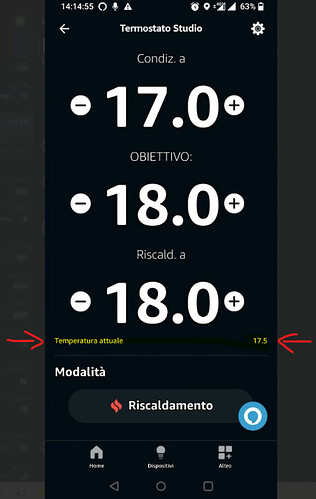Driver:
metadata {
definition (name: "Virtual Thermostat Device",
namespace: "piratemedia",
author: "Eliot S.") {
capability "Thermostat"
capability "Thermostat Heating Setpoint"
capability "Thermostat Cooling Setpoint"
capability "Thermostat Setpoint"
capability "Sensor"
capability "Actuator"
command "refresh"
command "setVirtualTemperature", ["number"]
command "setHeatingStatus", ["string"]
command "setCoolingStatus", ["string"]
attribute "temperatureUnit", "string"
}
}
def shouldReportInCentigrade() {
try {
def ts = getTemperatureScale();
return ts == "C"
} catch (e) {
log.error e
}
return true;
}
def installed() {
initialize()
}
def configure() {
initialize()
}
private initialize() {
setHeatingSetpoint(defaultTemp())
setCoolingSetpoint(defaultTemp())
setVirtualTemperature(defaultTemp())
setHeatingStatus("off")
setCoolingStatus("off")
setThermostatMode("off")
sendEvent(name:"supportedThermostatModes", value: ['heat', 'cool', 'off'], displayed: false)
sendEvent(name:"supportedThermostatFanModes", values: [], displayed: false)
state.tempScale = "C"
}
def getTempColors() {
def colorMap
if(shouldReportInCentigrade()) {
colorMap = [
[value: 0, color: "#153591"],
[value: 7, color: "#1e9cbb"],
[value: 15, color: "#90d2a7"],
[value: 23, color: "#44b621"],
[value: 29, color: "#f1d801"],
[value: 33, color: "#d04e00"],
[value: 36, color: "#bc2323"]
]
} else {
colorMap = [
[value: 40, color: "#153591"],
[value: 44, color: "#1e9cbb"],
[value: 59, color: "#90d2a7"],
[value: 74, color: "#44b621"],
[value: 84, color: "#f1d801"],
[value: 92, color: "#d04e00"],
[value: 96, color: "#bc2323"]
]
}
}
def unitString() { return shouldReportInCentigrade() ? "C" : "F" }
def defaultTemp() { return shouldReportInCentigrade() ? 20 : 70 }
def lowRange() { return shouldReportInCentigrade() ? 9 : 45 }
def highRange() { return shouldReportInCentigrade() ? 45 : 113 }
def getRange() { return "${lowRange()}..${highRange()}" }
def getTemperature() {
return device.currentValue("temperature")
}
def setHeatingSetpoint(temp) {
def ctsp = device.currentValue("thermostatSetpoint")
def chsp = device.currentValue("heatingSetpoint")
if(ctsp != temp || chsp != temp) {
sendEvent(name:"thermostatSetpoint", value: temp, unit: unitString(), displayed: false)
sendEvent(name:"heatingSetpoint", value: temp, unit: unitString())
}
}
def setCoolingSetpoint(temp) {
def ctsp = device.currentValue("thermostatSetpoint")
def ccsp = device.currentValue("coolingSetpoint")
if(ctsp != temp || ccsp != temp) {
sendEvent(name:"thermostatSetpoint", value: temp, unit: unitString(), displayed: false)
sendEvent(name:"coolingSetpoint", value: temp, unit: unitString())
}
}
def parse(data) {
log.debug "parse data: $data"
}
def refresh() {
log.trace "Executing refresh"
sendEvent(name: "supportedThermostatModes", value: ['heat', 'cool', 'off'], displayed: false)
sendEvent(name: "supportedThermostatFanModes", values: [], displayed: false)
}
def getThermostatMode() {
return device.currentValue("thermostatMode")
}
def getOperatingState() {
return device.currentValue("thermostatOperatingState")
}
def getThermostatSetpoint() {
return device.currentValue("thermostatSetpoint")
}
def getHeatingSetpoint() {
return device.currentValue("heatingSetpoint")
}
def getCoolingSetpoint() {
return device.currentValue("coolingSetpoint")
}
def setThermostatMode(mode) {
if(device.currentValue("thermostatMode") != mode) {
sendEvent(name: "thermostatMode", value: mode)
}
}
def changeMode() {
def currentMode = device.currentValue("thermostatMode")
def newMode = (currentMode == "off") ? "heat" : (currentMode == "heat") ? "cool" : "off"
setThermostatMode(newMode)
return newMode
}
def setVirtualTemperature(temp) {
sendEvent(name:"temperature", value: temp, unit: unitString(), displayed: true)
}
def setHeatingStatus(string) {
if(device.currentValue("thermostatOperatingState") != string) {
sendEvent(name:"thermostatOperatingState", value: string)
}
}
def setCoolingStatus(string) {
if(device.currentValue("thermostatOperatingState") != string) {
sendEvent(name:"thermostatOperatingState", value: string)
}
}



